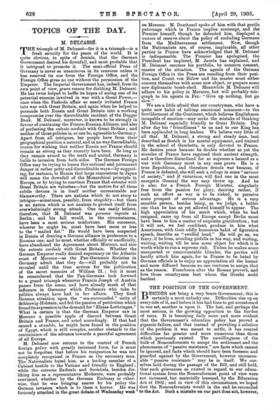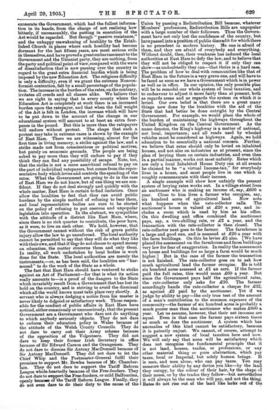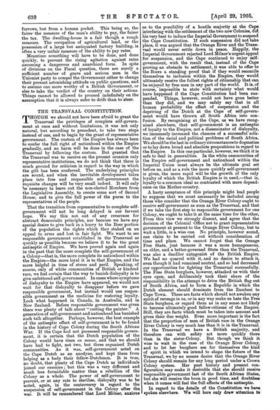B ESIDES not being a very brave Government, this is certainly
a most unlucky one. Difficulties rise up on every side of it, and before it has had time to get accustomed to one set, another is upon it. The last, and perhaps the most serious, is the growing opposition to the burden of rates. It is becoming daily more and more evident that the Government's education policy has proved a gigantic failure, and that instead of providing a solution of the problem it was meant to settle, it has created difficulties far greater and more numerous than those which previously existed. The unwillingness of the bulk of Nonconformists to accept the settlement and the phenomena of "passive resistance" are facts which cannot be ignored, and facts which should have been foreseen and guarded against by the Government, however unreason- able "passive resistance" may be in itself. We our- selves held during the passage of the Bill, and still hold, that such grievances as existed in regard to our educa- tional system from the Nonconformist point of view were not increased, but materially lessened, by the Education Act of 1902; and in view of this circumstance, we hoped that the Nonconformists would in the end be reconciled to the Act. Such a mistake on our part does not, however, exonerate the Government, which had the fullest informa- tion in its hands, from the charge of not realising how bitterly, if unreasonably, the putting in execution of the Act would be regarded. But though "passive resistance," and the unhappy reawakening of hostility to the Estab- lished Church in places where such hostility had become dormant for the last fifteen years, are most serious evils in themselves, and have proved a great embarrassment to the Government and the Unionist party, they are nothing, from the party and political point of view, compared with the wave of dissatisfaction that is now passing over the country in regard to the great extra financial burden which is being imposed by the new Education Act. The religious difficulty is only a difficulty, even if we grant the extreme Noncon- formist contention, felt by a small percentage of the popula- tion. The increase in the burden of the rates, on the contrary, irritates all creeds and all classes alike. We believe that we are right in saying that in every county where the Education Act is completely at work there is an increased burden upon the ratepayer, and that when the full weight of the Act is felt in London, the increase which will have to be put down to the account of the change in our educational system will amount to at least an extra four- pence in the pound. But this is more than the ratepayers will endure without protest. The shape that such a protest may take in extreme cases is shown by the example of East Ham. There we are witnessing, almost for the first time in living memory, a strike against the law, and a strike made not from conscientious or political motives, but purely on economic grounds. The people are being asked to pay more than they will endure to pay if they think they can find any possibility of escape. Note, too, that the strike is not a mere anarchical refusal to pay on the part of individual ratepayers, but comes from the repre- sentative body which levies and controls the spending of the rates. What the Government are going to do in the case of East Ham we do not know, but of one thing we are con- fident. If they do not deal strongly and quickly with the whole matter, East Ham is certain to find imitators. Once allow the localities to feel that they can avoid public burdens by the simple method of refusing to bear them, and local representative bodies are sure to be elected on the policy of refusing to put onerous and unpopular legislation into operation. In the abstract, we sympathise with the attitude of a district like East Ham, where, since there is no rich quarter to contribute, the poor have, as it were, to live on each other. We hold, however, that the Government cannot without the risk of grave public injury allow the law to go unenforced. The local authority cannot be permitted to say that they will do what they like with their own, and that if they do not choose to spend money on education, the matter czncerns them and only them. In reality, all work undertaken by local bodies is work done for the State. The local authorities are merely the instruments,—or, as has been said, the localities are "har- nessed" to do the work of the State as a whole.
The fact that East Ham should have ventured to strike against an Act of Parliament—for that is what its action really amounts to—is a proof of the dangers to the State which invariably result from a Government that has lost its hold on the country, and is striving to avoid the dismissal which all the world knows must take place very shortly. A servant who is always dodging a notice from his master is never likely to dolgood or satisfactory work. Those respon- sible for the conduct of public affairs in East Ham have noticed, either consciously or unconsciously, that the present Government are a Government who dare not do anything to which anybody seriously objects. They do not dare to enforce their education policy in Wales because of the attitude of the Welsh County Councils. They do not dare to carry out their Army scheme because of the opposition of the Volunteers. They did not dare to keep their former Irish Secretary in office because of Sir Edward Carson and the Orangemen. They do not dare to dismiss Sir Antony MacDonnell because of Sir Antony MacDonnell. They did not dare to let the Chief Whip and the Postmaster-General fulfil their promises to support Mr. Bowles because of Mr. Chamber- lain. They do not dare to support the Tariff Reform League whole-heartedly because of the Free-fooders. They do not dare to support the Free-fooders, or mild Balfourites, openly because of the Tariff Reform League. Finally, they do not even dare to do their duty to the cause of the ment have not only lost the confidence of the country, but have passed into a position of public discredit for which there is no precedent in modern history. No one is afraid of them, and they are afraid of everybody and everything. Without doubt, then, their weakness has induced the local authorities at East Ham to defy the law, and to believe that they will not be obliged to respect it if only they can show—as undoubtedly they can—that theirs is a hard case. The problem of how to deal with communities like that of East Ham in the future is a very grave one, and will have to be faced as soon as we have a Government which is in power as well as in office. In our opinion, the only possible plan will be to remodel our whole system of local taxation, and to endeavour to adjust it more fairly than at present, both as regards areas and as regards the system on which it is levied. Our own belief is that there are a great many things now done by the localities with the aid of the State that had better be done outright by the Central Government. For example, we would place the whole of the burden of maintaining the highways throughout the United Kingdom on the Central Government. As the name denotes, the King's highway is a matter of national, not local, importance ; and all roads used by wheeled vehicles must be considered as highways. Again, we hold education to be essentially a national concern. Further, we believe that rates should only be levied on inhabited houses, and not also on industries as at present, since the plan of levying them on certain industries, and even then in a partial manner, works out most unfairly. Rates which are only a local Inhabited House Duty can at all events be claimed to be "a virtual Income-tax," for everybody lives in a house, and most people live in one which is roughly commensurate with their income.
A single example will show how unfairly the present system of levying rates works out. In a village street lives an auctioneer who is making an income of, say, .P..600 year. Close to him lives a farmer who occupies, say, six hundred acres of agricultural land. Now note what happens when the rate-collector calls. The auctioneer house is valued at .220 a year, and in- cludes a room which is used by him as his office. On this dwelling and office combined the auctioneer pays, say, a two-shilling rate, or ..t2 a year, and the transaction with the rate-collector is then closed. The rate-collector next goes to the farmer. The farmhouse is a large and good one, and is assessed at £20 a year with the farm buildings. On this he levies ..t2 also. [We have placed the assessment on the farmhouse and farm buildings very low for fear of exaggeration. In reality the assessment on house and buildings for so large a farm would be much higher.] But in the case of the farmer the transaction is not finished. The rate-collector goes on to ask how much agricultural land the farmer occupies. He is told six hundred acres assessed at £1 an acre. If the farmer paid the full rates, this would mean £60 a year. But since the Government pays half the agricultural rates, the rate-collector only asks for ..£30. The farmer accordingly hands the rate-collector a cheque for £32, as against £2 paid by the auctioneer. Yet if we judge by ability to pay—the only true test of the amount of a man's contribution to the common expenses of the community—the farmer of six hundred acres is probably a much poorer man than the auctioneer who makes £600 a year. Let us assume, however, that their net incomes are equal. Even in that case the farmer pays sixteen times as much as does the auctioneer. A system which has anomalies of this kind cannot be satisfactory, because it is patently unjust. We cannot, of course, attempt to suggest a new system of local taxation here and now. We will only say that none will be satisfactory which does not recognise the fundamental principle that it is not land, houses, trades, or professions, or any other material thing or pure abstraction, which pay taxes, local or Imperial, but solely human beings. It is men, and men alone, who can pay taxes. You may measure their ability by any device you like—by the lan4 they occupy, by the colour of their hair, by the shape of their noses, or by the trades they follow—but nevertheless it will always be the man who will pay, and not the thing. Rates do not rise out of the land like larks out of the furrows, but from a human pocket. This being so, the fairer the measure of the man's ability to pay, the fairer the tax. The dwelling-house is a fair though a rough measure. The occupation of agricultural land, or the possession of a large but antiquated factory building, is often a very unfair measure of the ability to pay rates. Meantime something will have to be done, and done quickly, to prevent the rising agitation against rates assuming a dangerous and anarchical form. In spite of divisions on the Fiscal question, there are surely a sufficient number of grave and serious men in the Unionist party to compel the Government either to change their present astonishing attitude on public questions, and to assume one more worthy of a British Government, or else to take the verdict of the country on their actions. Things cannot be allowed to proceed indefinitely on the assumption that it is always safer to drift than to steer.




















































 Previous page
Previous page